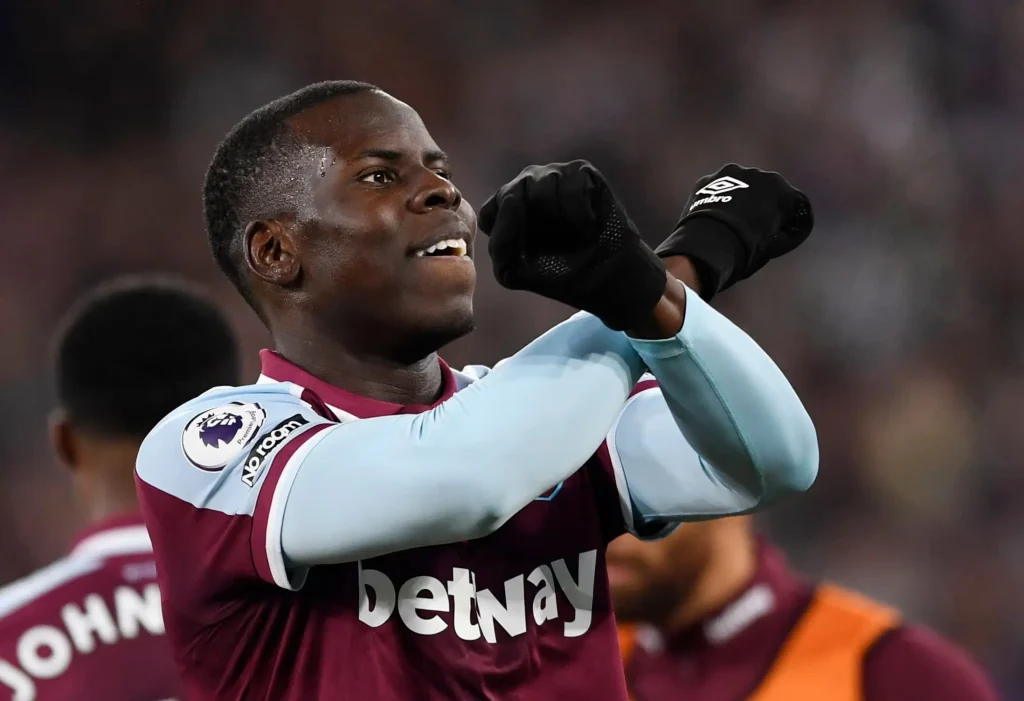West Ham United defender Kurt Zouma has been fined two weeks’ wages, amounting to £250,000 (over N170 million at the time), following the emergence of a video showing him kicking and slapping his pet cat. The incident, which sparked widespread outrage in the English media and among fans, has led to significant consequences for the French international, including the loss of his cats to the Royal Society for the Prevention of Cruelty to Animals (RSPCA) and the suspension of a club sponsorship.
Details of the Incident and Fine
The disturbing video, first published by The Sun and filmed by Zouma’s brother Yoan, captured Zouma dropping a Bengal cat from chest height, kicking it across his kitchen, throwing shoes at it, and slapping its head. The footage, initially shared on Snapchat, prompted immediate backlash, with over 350,000 people signing a Change.org petition calling for Zouma’s prosecution. West Ham swiftly imposed the maximum fine permissible under Professional Footballers’ Association (PFA) rules—two weeks’ wages, equivalent to £250,000 given Zouma’s £125,000 weekly salary. The club confirmed that the fine would be donated to animal welfare charities.
In a statement, West Ham condemned Zouma’s actions, stating, “Kurt is extremely remorseful and, like everyone at the Club, fully understands the depth of feeling surrounding the incident.” The club is cooperating with an RSPCA investigation, and Zouma voluntarily handed over his two cats for assessment. The RSPCA confirmed, “The cats are safe and in our care, having been taken for a vet check-up.”
Public and Professional Backlash
The decision to play Zouma in West Ham’s 1-0 Premier League win over Watford on February 8, 2022, just hours after the video surfaced, drew sharp criticism. Fans, including Watford supporters, booed Zouma throughout the match, and public figures like London Mayor Sadiq Khan and conservationist Chris Packham condemned the club’s choice. Khan called it “despicable” and expressed disappointment in manager David Moyes, while Packham labeled the decision an “absolute disgrace,” arguing that it normalized animal cruelty.
Former Premier League goalkeeper Chris Kirkland echoed these sentiments, suggesting Zouma’s actions warranted the same punishment as players banned for racial abuse, given the defenselessness of the animal. “If this was a racist incident, he wouldn’t play again,” Kirkland stated, highlighting the severity of the act. The West Ham United Supporters’ Trust called Zouma’s behavior “absolutely horrific” and urged him to work with the RSPCA to understand the consequences of his actions.
Sponsorship and Legal Repercussions
The fallout extended to West Ham’s commercial partnerships. Vitality, the club’s official wellness partner, suspended its sponsorship, stating, “We condemn animal cruelty and are hugely disappointed by the club’s response.” Adidas also terminated Zouma’s personal sponsorship deal, confirming, “Kurt Zouma is no longer an Adidas contracted athlete.” Another sponsor, Experience Kissimmee, announced it was evaluating its relationship with the club.
The RSPCA, in collaboration with Essex Police, launched an investigation into the incident, with Zouma and his brother Yoan later charged under the Animal Welfare Act. On May 24, 2022, Zouma pleaded guilty to two counts of causing unnecessary suffering to a protected animal, while Yoan admitted to one count of aiding and abetting. On June 1, 2022, Zouma was sentenced to 180 hours of community service, banned from keeping cats for five years, and ordered to pay nearly £9,000 in court costs. Yoan received 140 hours of community service.
Broader Implications
The case sparked significant debate about accountability for public figures and the treatment of animals. In France, where animal cruelty can carry a penalty of up to four years in prison and a £50,000 fine, the 30 Million Friends Foundation filed a complaint against Zouma and called for his suspension from the national team. The incident also led to new UK sentencing guidelines, dubbed the “Kurt Zouma rule,” which impose harsher penalties for animal cruelty posted online, recognizing such acts as aggravated behavior under the Animal Welfare Act.
Zouma issued a public apology, stating, “There are no excuses for my behavior, which I sincerely regret. Our cats are perfectly fine and healthy.” However, the RSPCA noted that the cats remained in their care, with plans to rehome them to loving homes.
Critical Reflection
While West Ham’s fine and the RSPCA’s actions reflect a commitment to addressing animal cruelty, the decision to field Zouma so soon after the incident raises questions about the club’s priorities. The significant public and commercial backlash suggests a broader societal expectation for accountability, particularly for high-profile athletes who serve as role models. The case also highlights the need for consistent application of consequences across different forms of misconduct, as raised by critics like Kirkland.
The legal outcome and Zouma’s loss of sponsorships underscore the tangible repercussions of his actions, but the incident’s long-term impact on his career and public perception remains uncertain. As the RSPCA emphasized, “This case sends a clear message that animals should never be treated like this.”






